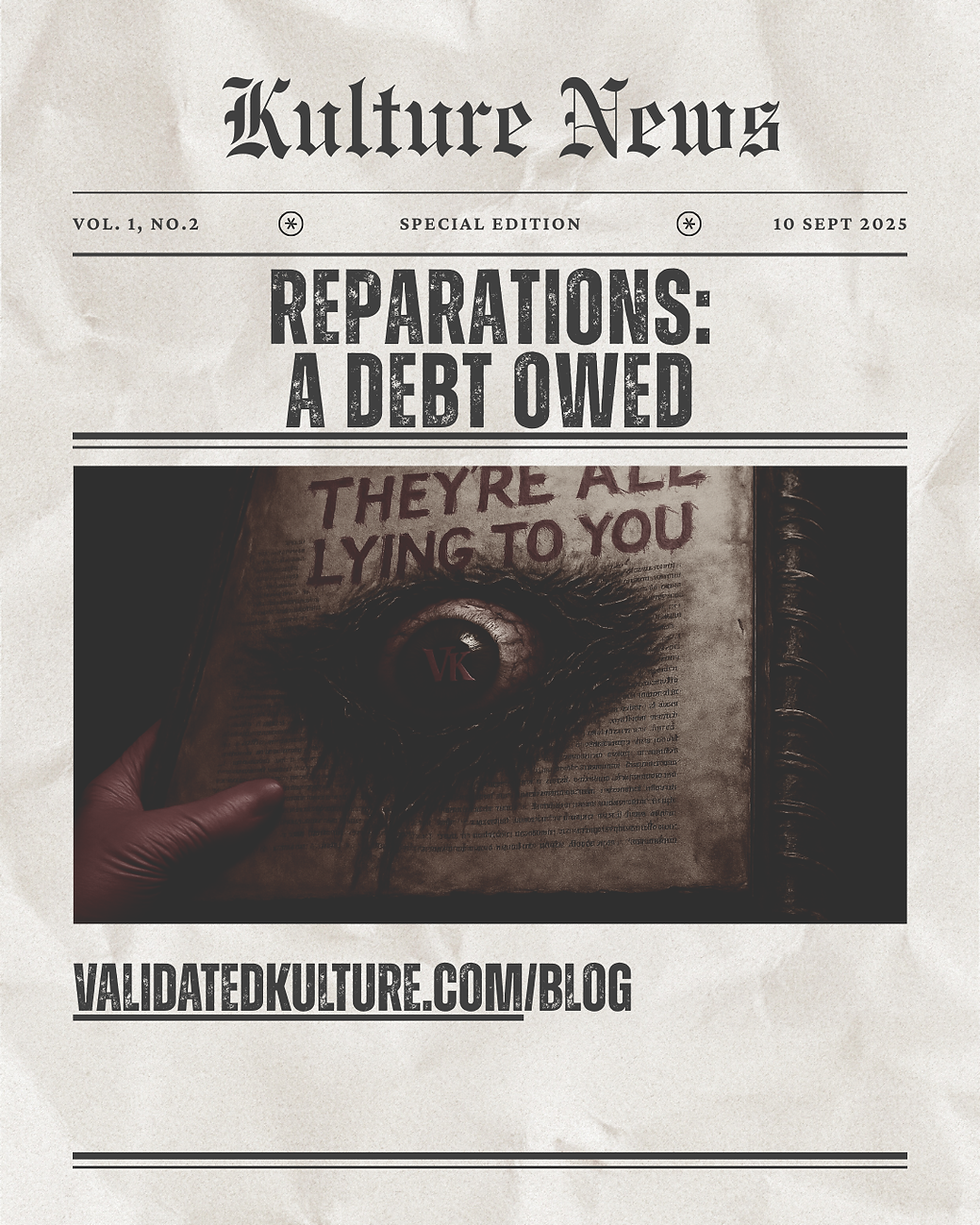Reparations: More Than a Check, It's a Reckoning (1/6)
- Validated Kulture
- Jul 17, 2025
- 4 min read

What motivated this series is the deep frustration I feel, not just from the silence around reparations, but from the widespread lack of understanding about the ongoing consequences of slavery in America. Too many people still believe that slavery is something this country “got over,” a distant atrocity with no bearing on life today. But let’s be clear: you don’t heal from generational trauma by ignoring it. You don’t undo centuries of violence, theft, and erasure with time alone.
Slavery never ended, it evolved. It transformed into sharecropping, Jim Crow, redlining, mass incarceration, political disenfranchisement, environmental racism, and economic exclusion. The trauma inflicted upon our ancestors wasn’t just physical, it was deeply psychological and emotional. And modern science now confirms what Black communities have always known: trauma can be inherited. It gets passed down in our DNA, our stress responses, our family dynamics, our health outcomes, and our sense of safety in this country.
Meanwhile, the U.S. government has sent trillions of dollars in aid to rebuild war-torn countries and stabilize foreign governments, yet continues to neglect the communities it built its wealth on the backs of. Black Americans, the very descendants of those who were enslaved have been met not with repair, but with containment. Welfare systems that monitor more than they support. Predatory policies that trap generations in poverty. A carceral system designed to harvest labor and destroy families. And through it all no formal, material, sustained acknowledgment of the debt owed.
This series was created to ignite dialogue around the ongoing conditions rooted in the absence of reparative justice, conditions that include the wealth gap, health disparities, political disenfranchisement, and generational underinvestment. But dialogue isn’t enough.
Our second goal is to move toward action, not by waiting for government programs or outside funding, but by beginning within the community. By organizing, investing in ourselves, reclaiming our narratives, and building the infrastructure necessary to demand and deliver justice. Because reparations aren’t just about compensation, they’re about transformation. And that transformation starts with us.
Reparations, by definition, are the act of making amends for a wrong done, by providing payment or other forms of compensation to those who have been harmed. In international law and moral philosophy, reparations are a recognized tool for addressing historical injustices, not just as a symbolic gesture, but as a material correction for systems of oppression and theft.
In the context of the United States, reparations for descendants of enslaved Africans are about much more than a one-time check. They represent a broad set of redress mechanisms designed to repair the long-lasting, systemic harm caused by slavery, legalized racial segregation, and generations of racially targeted policies.
The call for reparations in America is not new. In 1865, Union General William T. Sherman issued Special Field Order No. 15, which promised “40 acres and a mule” to formerly enslaved Black families along the Southern coast. This promise, which represented a tangible step toward justice and self-sufficiency, was swiftly revoked by President Andrew Johnson after Lincoln’s assassination. The land was returned to white former slave owners, and Black families were left with nothing.
Since then, reparations discussions have been raised repeatedly in the form of legislative proposals, lawsuits, and grassroots advocacy. These efforts have been repeatedly dismissed, defunded, or delayed.
In 1989, Congressman John Conyers introduced H.R. 40, a bill to study and develop reparations proposals for African Americans. For over 30 years, the bill was reintroduced each session but never made it to a full vote in Congress. Even as the conversation around reparations has grown, especially in the wake of uprisings against racial injustice, the U.S. has yet to officially reckon with the debt it owes.
Reparations for descendants of enslaved Africans must be comprehensive and far-reaching — not just symbolic gestures, but real investments in repairing the economic, social, and political damage inflicted over centuries. The harm caused by slavery didn’t end in 1865, it evolved into segregation, systemic disenfranchisement, and discriminatory policies that continue to shape Black life in America today. True reparations must account for this ongoing legacy by addressing the root causes of inequality and creating pathways toward self-determination, healing, and generational wealth.
This means investing in policies and programs that don’t just level the playing field, they begin to repair what was deliberately broken. A serious approach to reparations could include a combination of:
Land restitution or land grants
Direct cash payments or trust funds for families and communities
Policy reforms to dismantle racist laws and institutions
Free or subsidized access to quality education
Universal healthcare access and culturally competent services
Debt relief — including medical, credit, and student loan forgiveness
Tax exemptions or multi-generational tax breaks
Housing grants and guaranteed affordable homeownership pathways
Automatic restoration of voting rights for disenfranchised descendants
These are not handouts, they are overdue responses to sustained, state-sanctioned harm. The shape of reparations may differ across regions and communities, but the foundation is clear: repairing what was taken, restoring what was denied, and reclaiming the future.
Reparations are not about guilt, they’re about accountability. They are not about charity, they’re about justice. And they’re not about division, they’re about healing.
To ignore the need for reparations is to ignore the truth of this country’s past and its ongoing legacy. From the stolen labor that built the U.S. economy, to the political disenfranchisement that shapes our democracy, to the generational trauma encoded in policy, the effects of slavery and systemic racism remain deeply woven into the fabric of American life.
Reparations offer a way forward, rooted in truth, equity, and transformation.
.png)



Comments